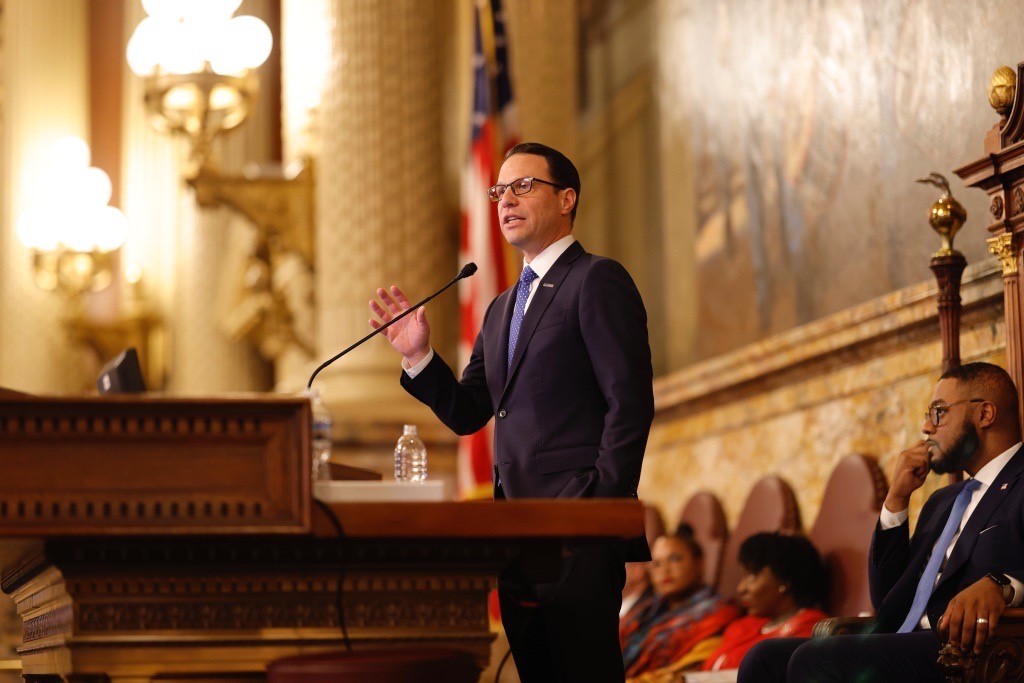Gov. Josh Shapiro delivered his first state budget address on Tuesday, proposing a 7% increase in basic education spending, more money for subsidized childcare, a boost in monthly minimum SNAP food aid benefits and a significant expansion of the state’s property tax and rent rebate program for senior citizens.
The governor’s budget proposes no major tax increases. It calls for $44.4 billion in general fund spending, up 3.7% over 2022-23.
“We can do big things again, if we work together,” Shapiro said in his speech at the Capitol. “… Instead of playing politics as usual, let’s show the people that we are up to this task.”
Shapiro, inaugurated in January, has positioned himself as a moderate, business-friendly Democrat. Unlike his predecessor, Gov. Tom Wolf, who faced Republican majority in both chambers of the legislature, Shapiro has a narrow 102-101 Democratic majority in the state House. Republicans have a solid majority in the state Senate, 28-22.
Highlights of his proposed budget include the following:
- An increase in the income cap on the Property Tax & Rent Rebate program from $35,000 for homeowners and $15,000 for renters to $45,000 across the board; and increasing the maximum rebate from $650 to $1,000. Raising the caps would allow about 175,000 additional Pennsylvanians to enroll. That would push total eligibility to nearly 600,000 — a little less than the total rebates issued in 2009 at the program’s peak, according to PennLive. Eligibility has declined ever since, as inflation pushes people above the income caps, which have not been adjusted.
- An increase in basic education spending to $8.2 billion and special education spending by nearly 10% to $1.4 billion. Shapiro called the proposed increases “a significant down payment” on making education funding more equitable, in line with last month’s Commonwealth Court decision. The budget proposes $500 million over five years for facility renovation.
- An increase of 50% in monthly minimum Supplemental Nutrition Assistance Program or SNAP benefits, as well as universal free school breakfast.
- An increase in Child Care Works funding by $67 million, enough to provide child care for 75,000 low-income families.
- Provision of a personal income tax credit of up to $2,500 a year for three years for individuals entering teaching, policing and nursing.
- Elimination of Pennsylvania’s tax on cell phone service. Instead, the 911 surcharge on phone bills would increase from $1.65 to $2.03, with funding directed to the 988 mental health hotline.
- For the first time, provision of $10 million in state funding for public defenders. Pennsylvania is one of just two states that provides no state-level funding for indigent legal defense, Shapiro said. He also called for increasing funding for parole and probation services.
- Provision of $500 million over five years for student mental health services. (Stephen Sharp, a school counselor at Hemfield School District, was one of Shapiro’s guests at the budget address.)
Pennsylvania has a comfortable $12 billion in budget reserves, thanks in part to federal pandemic aid. The state’s Independent Fiscal Office says the state’s deficit spending is on track to eat up that revenue by 2027; Shapiro said that estimate is based on pessimistic assumptions, and that his office is being even more conservative in its projections.
Initial Republican reactions to Shapiro’s budget were a mixed bag, with praise for some elements, such as increased support for education and law enforcement, coupled with calls for fiscal restraint.
“Now is not the time for excessive spending,” Rep. Milou Mackenzie, R-Lehigh, said in a statement.
The budget is due by June 30, in time for the start of Pennsylvania’s 2023-24 fiscal year on July 1.






